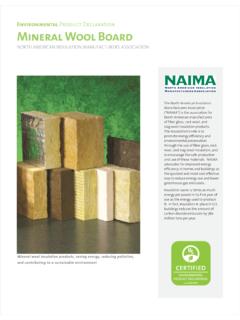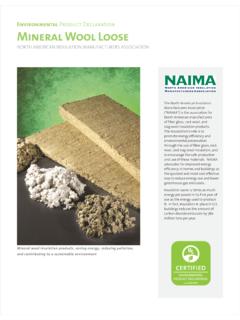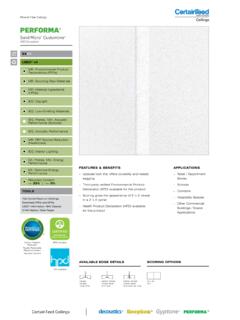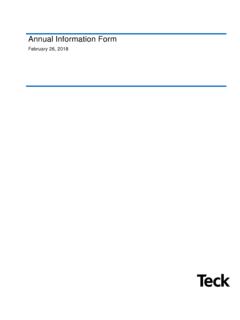Transcription of Anti-slavery / Human Trafficking and Conflict Minerals Policy
1 Anti-slavery / Human Trafficking and Conflict Minerals Policy At Industry Products Company (IPC), our work begins with individual challenges and ends with the manufacture of custom solutions for the Automotive and Industrial Sectors. IPC has manufacturing facilities in the United States as well as Mexico, all of which services our Customers. This Policy covers all IPC manufacturing facilities. IPC is committed to social and environmental responsibility and has zero tolerance for slavery, servitude, forced or compulsory labor and Human Trafficking . Modern slavery by whatever means can occur in various forms including indentured servitude and forced or compulsory labor. Modern slavery deprives the individual or group of individuals of their personal liberties in order to exploit those individuals for personal or commercial gain.
2 As part of this commitment, IPC has adopted Electronic Industry Citizenship Coalitions (EICC) Code of Conduct as IPC's Supplier Code of Conduct to which we hold ourselves and our supply chain. The Code is located at . While the EICC and Global e- Sustainability Initiative (GeSi) were initially instituted for the reporting of Conflict Minerals , the thought process holds true for all types of modern slavery. Suppliers are to be responsible from whom they procure product and need to be able to define whether suppliers are involved in the use of slavery or Human Trafficking in the production of their products. The EICC's and GeSI's work includes the Conflict -Free Smelter Program and the Conflict Minerals Reporting Template ( CFSI_CRMT Template ) which IPC utilizes for both its Annual Customer Reporting and Supplier Conflict Mineral Surveys.
3 The updated CMRT version released can be found along with training materials at The template provides a common industry approach for the collection of sourcing information related to Conflict Minerals . In most cases, IPC production suppliers are not affected by or have materials which contain Conflict Minerals . Many IPC Customers, regardless of location, are requiring due diligence in verifying that Conflict Minerals as well as slave / forced labor are not being used for their product . The information contained in the Conflict Mineral Template constitutes a critical part of IPC's due diligence By utilizing the CFSI_CRMT completed form, IPC has a recognized means to audit its suppliers. IPC requests an annual update from all of its production suppliers with regard to Conflict Minerals and forced / compulsory labor.
4 The Updated Supplier Response is compared to previous years'. responses. Any deviation from a previous year's response will require further supplier contact and 1. In July 2010, the Government signed the Dodd-Frank Wall Street Reform and Consumer Protection Act (the Dodd-Frank Act ). Section 1502 of the Dodd-Frank Act requires all US publicly traded companies to file disclosures and reports with the Securities and Exchange Commission related to the use of Conflict Minerals (tin, tantalum, tungsten and gold) in their products. Page 1 of 2. evaluation. If IPC suspects the potential of Conflict Minerals being present based on the supplier's processes or finished product , the supplier will be subjected to further scrutiny. If the supplier obtains materials or processes from countries based on the Government Trafficking Website further investigation will need to be completed.
5 There will be a separate request for verification of any known forced / compulsory labor in the supplier's production / supply chain. If during a consecutive previous two year period the supplier has not declared any Conflict Minerals or known forced / compulsory labor in their supply chain, a formal reply to the annual request will not be required. If the supplier has issued a declaration in which either Conflict Minerals or potential of forced / compulsory labor is present in their production or supply chain or if the supplier has not reported for two consecutive years due to being a new supplier or a reactivated supplier, a CFSI- CRMT form and a formal response to known forced / compulsory labor in the supplier's production /. supply chain will be required. IPC is dependent on its supplier's declaration and will scrutinize all responses it deems either inappropriate or suspect.
6 IPC does not support materials which are produced by forced / compulsory labor and to that end will request suppliers to remedy the situation or IPC will need to resource the material to a compliant supplier. During IPC visits or audits of either potential suppliers or present suppliers, the IPC employee will request to review forced / compulsory labor issues with the supplier. IPC training will consist of alerting new employees to its Policy on Anti-slavery - Human Trafficking . Training will be accomplished during new employee orientation as well as the public posting of its Policy for all employees. All employees directly involved with supplier selection as well as procurement will be advised of any changes to the Policy as well as updates to the government mandates. Employee issues will be directed to the person in the Human Resources Department in charge of this issue for resolution or clarification.
7 The IPC Leadership Team is responsible for this Policy and will undertake all reasonable and practical steps to ensure that the standards established in our Policy are not only known by our suppliers and employees but are implemented and follow both local and other regional regulations as well as those required by our customers. All non-compliance will be assessed on a case by case instance and appropriate action will be taken. Advance Purchasing / Materials Manager Page 2 of 2.





